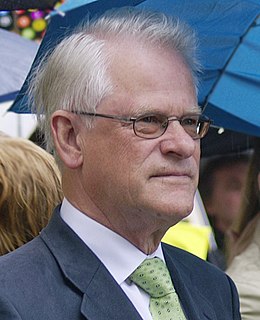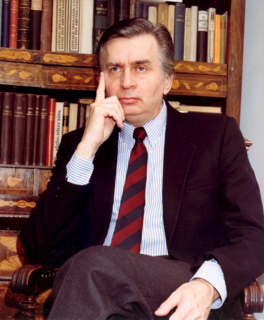
The Hungarian Workers' Party is a communist party in Hungary led by Gyula Thürmer. Established after the fall of the communist Hungarian People's Republic, the party has yet to win a seat in the Hungarian parliament. Until May 2009 it was a member of the Party of the European Left.

The Christian Democratic People's Party is a Christian-democratic political party in Hungary. It is officially a coalition partner of the ruling party, Fidesz, but is in reality a satellite party of Fidesz and has been unable to get into the Parliament on its own since 2006. For several elections prior to the pact, they had been unable to pass the election threshold of 5% of the vote. Without Fidesz, its support cannot be measured, and even a leading Fidesz politician, János Lázár, stated that Fidesz does not consider the government to be a coalition government.

General elections were held in Sweden on 18 September 1988. The Swedish Social Democratic Party remained the largest party in the Riksdag, winning 156 of the 349 seats.

Parliamentary elections were held in Hungary on 9 April 2006, with a second round of voting in 110 of the 176 single-member constituencies on 23 April. The Hungarian Socialist Party emerged as the largest party in the National Assembly with 186 of the 386 seats, and continued the coalition government with the Alliance of Free Democrats. It marked the first time a government had been re-elected since the end of Communist rule.

Parliamentary elections were held in Hungary on 7 April 2002, with a second round of voting in 131 of the 176 single member constituencies on 21 April. Although Fidesz remained the largest party in the National Assembly despite receiving fewer votes than the Hungarian Socialist Party, the Socialist Party was able to form a coalition government with the Alliance of Free Democrats.

The 1990 Hungarian parliamentary elections were held in Hungary on 25 March 1990, with a second round of voting taking place in all but five single member constituencies on 8 April. They were the first completely free and competitive elections to be held in the country since 1945, and only the second free elections in the country's history. The conservative, nationalist Hungarian Democratic Forum (MDF) beat the liberal and more internationalist Alliance of Free Democrats, which had spearheaded opposition to Communist rule in 1989, to become the largest party in parliament. The Hungarian Socialist Party, the former Communist party, suffered a crushing defeat, winning only 33 seats for fourth place.

Parliamentary elections were held in Hungary on 8 May 1994, with a second round of voting in 174 of the 176 single member constituencies on 29 May. They resulted in the return to power of the Hungarian Socialist Party, the former Communist party, under the leadership of Gyula Horn, who became Prime Minister. The Socialists achieved a remarkable revival, winning an overall majority of 209 seats out of 386, up from 33 in 1990. At the time, it was the most seats that a Hungarian party had ever won in a free election.

A referendum on revoking some medical and tuition fees was held in Hungary on 9 March 2008. The proposals would cancel government reforms which introduced doctor visit fees paid per visitation and medical fees paid per number of days spent in hospital as well as tuition fees in higher education. All three were supported by a majority of voters. Prime Minister Ferenc Gyurcsány stated that the fees would be abolished on 1 April 2008 following the referendum, but that the government had no funds available to replace the income lost for the higher educations institutions and health institutions due to the abolishment of the fees.
A referendum on joining the European Union was held in Hungary on 12 April 2003. The proposal was approved by 83.8% of voters, with a voter turnout of 45.6%. Hungary subsequently joined the EU on 1 May 2004.

Early general elections were held in Malta between 5 and 7 May 1951. They came less than a year after the previous elections as a result of disagreements in the coalition government formed by the centre-right Nationalist Party and centre-left Malta Workers Party. Although the Malta Labour Party received the most votes, the Nationalist Party remained the largest party, winning 15 of the 40 seats. Despite their previous disagreements, the Nationalist Party and Workers Party formed a new government.

A legislative election to elect the members of the 11th Imperial Council were held in Cisleithania, the northern and western ("Austrian") crown lands of Austria-Hungary, on 14 and 23 May 1907. They were the first elections held under universal male suffrage, after an electoral reform abolishing tax paying requirements for voters had been adopted by the Council and was endorsed by Emperor Franz Joseph earlier in the year. However, seat allocations were based on tax revenues from the States.

Parliamentary elections were held in Hungary on 25 and 26 January 1920. However, they were only held in 164 districts. After the Treaty of Trianon was signed, the 44 districts previously occupied by Romania voted between 13 June and 5 July, whilst the 11 districts occupied by Serbia did not vote until 30 and 31 October 1921. The election was held with compulsory voting. In protest at this and other changes to the franchise that left 60% of the voting age population unable to vote, the Hungarian Social Democratic Party boycotted the elections, and called for its supporters to cast invalid votes, resulting in an unusually high number of blank or invalid votes - 11.8% in the January elections and over 20% in Budapest and other major cities.

Parliamentary elections were held in Hungary between 28 May and 2 June 1922. The result was a victory for the Unity Party, which won 140 of the 245 seats in Parliament, the vast majority in "open" constituencies where there was no secret ballot.

Parliamentary elections were held in Hungary between 31 March and 7 April 1935. The result was a victory for the Party of National Unity, which won 164 of the 245 seats in Parliament. Gyula Gömbös remained Prime Minister.

Parliamentary elections were held in Hungary on 28 and 29 May 1939. The result was a victory for the Party of Hungarian Life, which won 181 of the 260 seats in Parliament. Pál Teleki remained Prime Minister. It won 72 percent of the parliament's seats and won 49 percent of the popular vote in the election. This was a major breakthrough for the far-right in Hungary.

Parliamentary elections were held in Hungary on 8 June 1985. The Hungarian Socialist Workers' Party was the only party to contest the elections, and won 288 of the 387 seats, with 98 of the remaining 99 going to independents selected by the party, whilst one seat remained unfilled until the following year.
The Agrarian Alliance – National Agrarian Party was a political party in Hungary.
The Entrepreneurs' Party was a political party in Hungary between 1989 and 2007.

The Hungarian Social Green Party, also known its shortened form Green Party, is a green anarchist political party in Hungary, founded in December 1995.
The Hungarian Workers' Democratic Center Party, was a minor political party in Hungary between 1989 and 1993.























